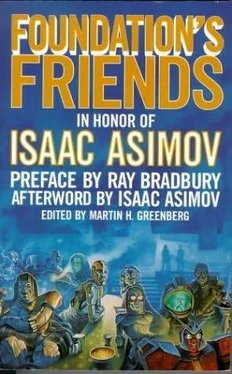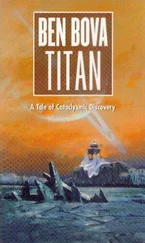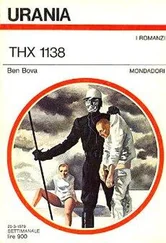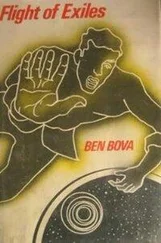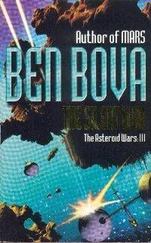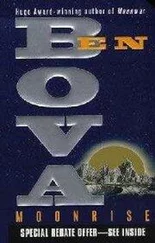Ben Bova - Foundation’s Friends
Здесь есть возможность читать онлайн «Ben Bova - Foundation’s Friends» весь текст электронной книги совершенно бесплатно (целиком полную версию без сокращений). В некоторых случаях можно слушать аудио, скачать через торрент в формате fb2 и присутствует краткое содержание. Год выпуска: 1989, ISBN: 1989, Издательство: Tor Books, Жанр: Фантастика и фэнтези, на английском языке. Описание произведения, (предисловие) а так же отзывы посетителей доступны на портале библиотеки ЛибКат.
- Название:Foundation’s Friends
- Автор:
- Издательство:Tor Books
- Жанр:
- Год:1989
- ISBN:ISBN: 0-312-93174-3
- Рейтинг книги:3 / 5. Голосов: 1
-
Избранное:Добавить в избранное
- Отзывы:
-
Ваша оценка:
- 60
- 1
- 2
- 3
- 4
- 5
Foundation’s Friends: краткое содержание, описание и аннотация
Предлагаем к чтению аннотацию, описание, краткое содержание или предисловие (зависит от того, что написал сам автор книги «Foundation’s Friends»). Если вы не нашли необходимую информацию о книге — напишите в комментариях, мы постараемся отыскать её.
Foundation’s Friends — читать онлайн бесплатно полную книгу (весь текст) целиком
Ниже представлен текст книги, разбитый по страницам. Система сохранения места последней прочитанной страницы, позволяет с удобством читать онлайн бесплатно книгу «Foundation’s Friends», без необходимости каждый раз заново искать на чём Вы остановились. Поставьте закладку, и сможете в любой момент перейти на страницу, на которой закончили чтение.
Интервал:
Закладка:
The City slept. The strips and expressways continued to move, carrying the few who were awake-young lovers who had crept out to meet each other, policemen on patrol, hospital workers heading home after a night shift, and restless souls drawn to wander the caverns of New York.
Amy stood on a strip, a sprinkling of people around her. Four boys raced past her, leaping from strip to strip; for a moment, she was tempted to join their race. She had come out at night a few times before, to practice some moves when the strips were emptier, returning to her subsection before her parents awoke. More riders began to fill the slowest strip; the City was waking. Her parents would be up by the time she got back, but she was sure they would understand why she had been drawn out here tonight.
Her parents had come with her to meet Elijah Baley and his group. The detective was a tall, dark-haired man with a long, solemn face, but he had brightened a little when Shakira introduced her new recruits. Amy’s mother and father had not gone Outside with them; perhaps they would next time. She knew what an effort it would be for them, and hoped they could find the courage to take that step. They would be with her when the group met again; they had promised that much. When she was able to face the openness without fear, to stride across the ground bravely as Shakira did, maybe she would lead them Outside herself.
She leaped up, spun around in a dervish, and ran along the strip. The band hummed under her feet; she could hear its music again. She bounded forward, did a handspring, then jumped to the next strip. She danced across the gray bands until she reached the expressway, then hauled herself aboard.
Her hands tightened around the pole as she recalled her first glimpse of daylight. The whiteness of the snow had been blinding, and above it all, in the painfully clear blue sky, was a bright ball of flame, the naked sun. She had known she was standing on a ball of dirt clad only in a thin veil of air, a speck that was hurtling through a space more vast and empty than anything she could see. The terror had seized her then, driving her back inside, where she had cowered on the floor, sick with fear and despair. But there had also been Shakira’s strong arms to help her up, and Elijah Baley’s voice telling her of his own former fears. Amy had not gone Outside again that day, but she had stood in the open doorway and forced herself to take one more breath of wintry air.
It was a beginning. She had to meet the challenge if she was ever to lead others Outside, or to follow the hopeful settlers to another world.
She left the expressway and danced along the strips, showing her form, imagining that she was running one last race. She was near the Hempstead street where she had met Shakira.
The street was nearly empty, its store windows darkened. Amy left the strips and hurried toward the tunnel, running along the passageway until her breath came in short, sharp gasps. When she reached the end, she hesitated for only a moment, then pressed her hand against the wall.
The opening appeared. The muted hum from the distant strips faded behind her, and she was Outside, alone, with the morning wind in her face. The sky was a dark dome above her. She looked east and saw dawn brightening the cave of stars.
The Asenion Solution
by Robert Silverberg
Fletcher stared bleakly at the small mounds of gray that were visible behind the thick window of the storage chamber.
“Plutonium-186,” he muttered. “Nonsense! Absolute nonsense!”
“Dangerous nonsense, Lew,” said Jesse Hammond, standing behind him. “Catastrophic nonsense.”
Fletcher nodded. The very phrase, “plutonium-186,” sounded like gibberish to him. There wasn’t supposed to be any such substance. Plutonium-186 was an impossible isotope, too light by a good fifty neutrons. Or a bad fifty neutrons, considering the risks the stuff was creating as it piled up here and there around the world. But the fact that it was theoretically impossible for plutonium-186 to exist did not change the other, and uglier, fact that he was looking at three kilograms of it right this minute. Or that as the quantity of plutonium-186 in the world continued to increase, so did the chance of an uncontrollable nuclear reaction leading to an atomic holocaust.
“Look at the morning reports,” Fletcher said, waving a sheaf of faxprints at Hammond. “Thirteen grams more turned up at the nucleonics lab of Accra University. Fifty grams in Geneva. Twenty milligrams in-well, that little doesn’t matter. But Chicago, Jesse, Chicago-three hundred grams in a single chunk!”
“Christmas presents from the Devil,” Hammond muttered.
“Not the Devil, no. Just decent serious-minded scientific folk who happen to live in another universe where plutonium-186 is not only possible but also perfectly harmless. And who are so fascinated by the idea that we’re fascinated by it that they keep on shipping the stuff to us in wholesale lots! What are we going to do with it all, Jesse? What in God’s name are we going to do with it all?”
Raymond Nikolaus looked up from his desk at the far side of the room.
“Wrap it up in shiny red and green paper and ship it right back to them?” he suggested.
Fletcher laughed hollowly. ”Very funny, Raymond. Very, very funny.”
He began to pace the room. In the silence the clicking of his shoes against the flagstone floor seemed to him like the ticking of a detonating device, growing louder, louder, louder…
He-they, all of them-had been wrestling with the problem all year, with an increasing sense of futility. The plutonium-186 had begun mysteriously to appear in laboratories all over the world-wherever supplies of one of the two elements with equivalent atomic weights existed. Gram for gram, atom for atom, the matching elements disappeared just as mysteriously: equal quantities of tungsten-186 or osmium-186.
Where was the tungsten and osmium going? Where was the plutonium coming from? Above all, how was it possible for a plutonium isotope whose atoms had only 92 neutrons in its nucleus to exist even for a fraction of a fraction of an instant? Plutonium was one of the heavier chemical elements, with a whopping 94 protons in the nucleus of each of its atoms. The closest thing to a stable isotope of plutonium was plutonium-244, in which 150 neutrons held those 94 protons together; and even at that, plutonium-244 had an inevitable habit of breaking down in radioactive decay, with a half-life of some 76 million years. Atoms of plutonium-186, if they could exist at all, would come dramatically apart in very much less than one seventy-six millionth of a second.
But the stuff that was turning up in the chemistry labs to replace the tungsten-186 and the osmium-186 had an atomic number of 94, no question about that. And element 94 was plutonium. That couldn’t be disputed either. The defining characteristic of plutonium was the presence of 94 protons in its nucleus. If that was the count, plutonium was what that element had to be.
This impossibly light isotope of plutonium, this plutonium-186, had another impossible characteristic about it: not only was it stable, it was so completely stable that it wasn’t even radioactive. It just sat there, looking exceedingly unmysterious, not even deigning to emit a smidgen of energy. At least, not when first tested. But a second test revealed positron emission, which a third baffled look confirmed. The trouble was that the third measurement showed an even higher level of radioactivity than the second one. The fourth was higher than the third. And so on and so on.
Nobody had ever heard of any element, of whatever atomic number or weight, that started off stable and then began to demonstrate a steadily increasing intensity of radioactivity. No one knew what was likely to happen, either, if the process continued unchecked, but the possibilities seemed pretty explosive. The best suggestion anyone had was to turn it to powder and mix it with nonradioactive tungsten. That worked for a little while, until the tungsten turned radioactive too. After that graphite was used, with somewhat better results, to damp down the strange element’s output of energy. There were no explosions. But more and more plutonium-186 kept arriving.
Читать дальшеИнтервал:
Закладка:
Похожие книги на «Foundation’s Friends»
Представляем Вашему вниманию похожие книги на «Foundation’s Friends» списком для выбора. Мы отобрали схожую по названию и смыслу литературу в надежде предоставить читателям больше вариантов отыскать новые, интересные, ещё непрочитанные произведения.
Обсуждение, отзывы о книге «Foundation’s Friends» и просто собственные мнения читателей. Оставьте ваши комментарии, напишите, что Вы думаете о произведении, его смысле или главных героях. Укажите что конкретно понравилось, а что нет, и почему Вы так считаете.
